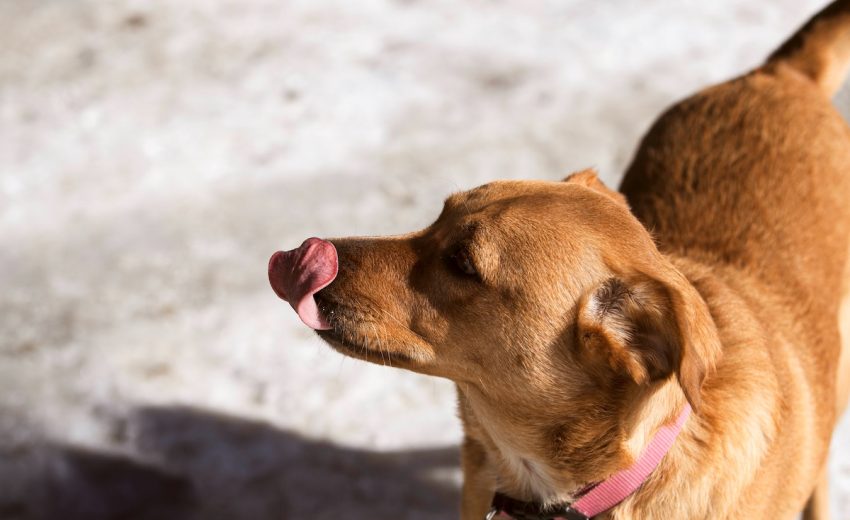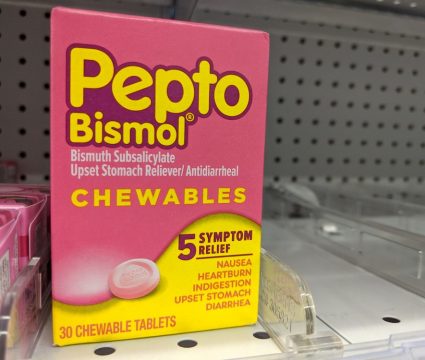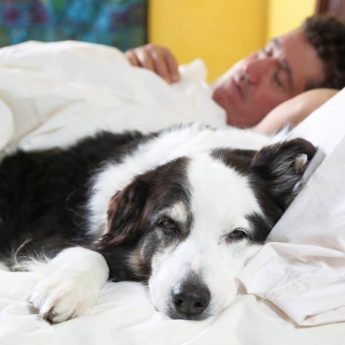Has your pooch caught a bit of the stomach bug? Is it coming out the front, the back or even both ends?!
Digestive upset is one of the most common canine ailments. Almost every dog owner has experienced a time when their dog has had vomiting or diarrhea. Sometimes these problems will resolve on their own, while others will result in a trip to the vet hospital for urgent care.
Knowing what to do when your dog is sick does not always come naturally, so we’re supplying you with the need-to-know info on what to do when your dog’s tummy acts up.
Note: The content within this article should not replace any recommendations given by your veterinarian. Whenever vomiting or diarrhea occurs, you should seek veterinary guidance first.
Why Do Dogs Get Upset Stomachs?
Upset stomachs in dogs are generally characterized by vomiting, diarrhea, and/or nausea.
These signs can be caused by a vast amount of diseases and illnesses that affect the digestive tract. Some of the most common causes of stomach upset are:
- Sudden Change in Diet
- Gastrointestinal Parasites
- Viral Infections (Parvo, Distemper, etc.)
- Bloat (GDV)
- Foreign Body Obstruction
- Food sensitivity or Contamination
- Bacterial Infection
- Pancreatitis
- Kidney Disease
- Cancer
- Motion Sickness
- Toxicity
- Liver Disease
- Antibiotic Use
- And many more…
What Are Some Signs of an Upset Stomach?
The most common signs of an upset stomach are:
- Vomiting
- Diarrhea
- Retching
- Lethargy
- Abdominal Pain
- Lack of Appetite
- Drooling and Lip Licking
- Noisy gurgling stomach
Should I Feed my Dog if He is Sick?
Generally, when we suspect that dogs have an upset stomach, we want to stop offering food. We do this because we want to lessen the irritation in the stomach and digestive tract. Often, the best way to do this is to ensure that the digestive tract is completely empty of food.
It may seem counterintuitive to stop giving water to a dog with vomiting or diarrhea, but giving water can sometimes further aggravate your dog’s upset stomach. This will cause more vomiting and diarrhea, which we want to avoid. Sometimes, fasting is the best medicine.
- Step #1: Halt the Food & Water Intake. Withhold food for about 24 hours, or as long as your veterinarian suggests. While it may be hard to deny your pup comfort food when he or she is sick, food can often exacerbate tummy troubles. Your dog may have the urge to gulp down water, but this can be problematic as well. Instead, remove water from your dog’s dish and provide ice chips every couple of hours instead, to prevent dehydration.
- Step #2: Continue to Provide Water, but Encourage Your Dog to Drink Slowly. You need to ensure your dog remains hydrated, but you don’t want him gulping down huge quantities of water, as this may trigger vomiting. So, offer him a small amount of water in his dish, wait about 10 minutes, and then offer a little more. Continue doing so until you’re sure your dog is able to keep the water down, then, you can resume providing water as per usual. Pedialyte can also be given to your dog as an electrolyte supplement.
- Step #3: Reintroducing Food. After withholding food for about 24 hours, you can resume feeding your dog small quantities of bland food (just note that puppies or dogs with diabetes should not be fasted this long — simply follow your vet’s advice in these cases).
- Step #4: Increasing Feeding Amounts. As long as the digestive upset is at bay, you can gradually begin to increase the amount of food and water offered until you are feeding a full meal.
- Step #5: Switching to Dog Food. If vomiting or diarrhea have resolved, you can slowly transition your dog from a bland diet to his regular dog food. Transition by slowly increasing the ratio of bland diet to dog food, starting at a ratio of 75% bland to 25% kibble. Continue this transition for a minimum of five days.
If vomiting or diarrhea persist, contact your veterinarian as soon as possible.
NOTE: While this process works well for adult dogs with upset stomachs, young puppies and diabetic dogs should not be fasted for prolonged periods of time due to drops in blood sugar. Vomiting in these animals requires urgent veterinary attention as it may be a sign of a more serious issue.
Preventing Dehydration When Your Dog Is Sick
Dehydration is also a serious concern when your dog is ill. Chronic or frequent vomiting can cause pets to become dehydrated very quickly.
It is important to make sure your pet remains hydrated by continuously offering small amounts of fluids or ice chips. Learn more about the signs of dehydration and rehydrating your dog with Pedialyte here.
If your pet cannot keep down any fluids, do not continue to offer water. At this point, your pet either needs time to allow his stomach to settle, or he requires medical intervention in the form of fluid therapy or anti-nausea medication.
What Should I Feed My Dog With An Upset Stomach?

Dogs with digestive upset should be fed a bland diet. These diets consist of easily digestible proteins and carbohydrates that should not further irritate the stomach.
The most common proteins to offer are:
- Chicken
- Turkey
- Lean Ground Beef
All of these items should be free of bone, seasoning, fat, and should be boiled in water until cooked thoroughly.
Easily digestible carbohydrates include:
- Boiled Rice
- Boiled Potatoes
The diet should consist of one part protein to two parts carbohydrates.
If your dog does not like the bland diet, you can try a few tricks to entice him to eat:
- Warming Up The Food. Try warming the food to make it more appealing to your pup.
- Chicken Broth. Adding warm low-sodium chicken broth to make a yummy soup-style dish for your dog.
- Try Baby Food. Meat-based baby foods without seasonings can also be used in place of whole proteins. Some dogs go nuts for it!
This video from Pet Plus explains a bit more about what to feed your dog when they have an upset tummy!
Alternative Option: Get Prescription Diet From Your Vet
Prescription diets for digestive upset are available through your veterinarian. While not inexpensive, these are a convenient way to offer a bland diet and saves you the hassle of running to the grocery store and preparing a whole meal.
Dogs who regularly get upset stomachs may need to go on a special prescription diet permanetly, in which case you’ll need to talk to your vet about which kind of prescription dog food is best for your dog’s unique needs.
Probiotics: A Little Bacteria Goes a Long Way
With an upset stomach, the bacteria that assist with digestion can go a little haywire. Probiotics work by re-establishing the beneficial bacteria in the gut. These supplements are often effective for resolving diarrhea in cases of bacterial imbalance.
Ask your veterinarian if probiotic supplements are appropriate for your dog’s condition. I always keep Fortiflora packets on hand just in case.
When is a Dog’s Upset Stomach an Emergency?
There are several situations where an upset stomach is considered an emergency:
- Foreign Object. When you suspect that your dog has eaten a foreign object.
- Blood. Any presence of blood in vomit or stool.
- Swollen Stomach. A swollen, bloated, or painful abdomen can be a sign of bloat or that your dog may have ingested a foreign object.
- Toxic Substance. In the event of the ingestion of a toxic substance, emergency attention is needed.
- Fever or Pale Gums. These signs may indicate a more severe underlying condition, like pneumonia or anemia.
- Severe Lethargy or Weakness. Displaying signs of extreme lethargy or weakness, such as not getting up for a treat or food.
- In Young, Old, or Chronically Ill Dogs. These dogs are more fragile, which means an upset stomach could lead to something serious very quickly.
- Continuous Vomiting. Contact your vet anytime your pet suffers from continuous vomiting or vomiting lasting over 24 hours. The same is true of prolonged and unproductive retching (when your dog makes the motion or sounds of vomiting).
- In Diabetic Animals. Some of these animals require insulin that cannot be administered while the animal is vomiting.
- With Signs of Dehydration. Extreme dehydration along with an upset stomach means that your dog is unable to take in liquids, which can be deadly if not quickly resolved.
- Refusal to Eat or Drink for More Than 24 Hours. Refusing to eat or drink is often a sign that something is seriously wrong internally.
Should I Give My Sick Dog Medication?
No, you shouldn’t give your dog medication for an upset stomach unless stated otherwise by your veterinarian.
Human medications are often toxic to our dogs and can cause further problems. Even animal medications should not be administered unless prescribed by a veterinarian.
Without knowing the cause of the vomiting, medication cannot safely be given. Some medications designed to treat general digestive upset can cause further complications and actually worsen the condition.
Have you ever had a sick pup on your hands? What methods did you use to resolve an upset stomach?








1 Comment
November 12, 2019
Great post. It’s true. There are a lot of reasons why a dog has an upset stomach the most common is a sudden change in diet. Dogs can be sensitive to what they eat and they will suddenly start vomiting if they ingested something new in their system. Dogs can heal on its own but if your dog continues to vomit for a couple of days then it’s better to get it properly diagnosed by a veterinarian. Thanks for sharing. Here’s another article about dogs upset stomach. I hope this helps your readers. https://ultimatepetnutrition.com/dog-stomach-ache/